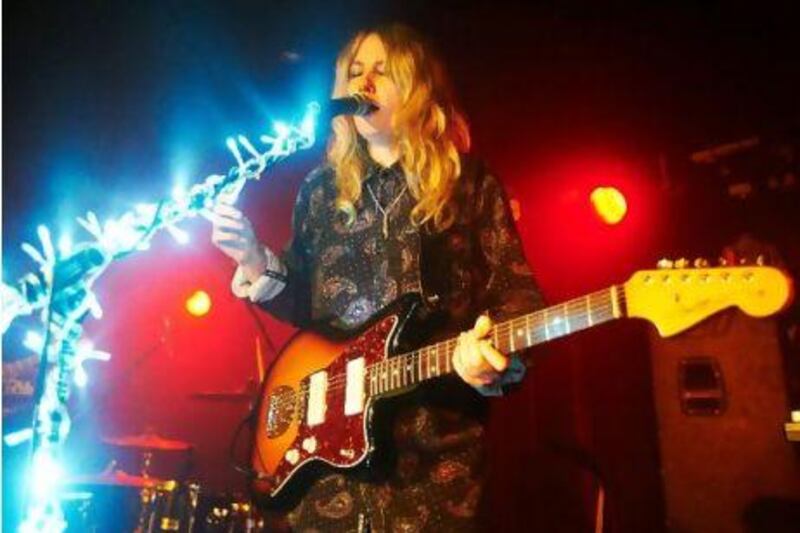"At breakfast," Pip Brown recently confided, "if an egg's too runny it can ruin my whole day." Reading that statement of early morning angst, it will come as no surprise that the singer-songwriter better known as Ladyhawke has titled her new album Anxiety.
That title, says the 32-year-old New Zealander, is "sort of a tongue-in-cheek poke at myself". It's a joke, but one that makes light of the album's traumatic birth.
Upon its release in September 2008, Brown had promoted her first record pretty intensely and the self-titled Ladyhawke LP won rave reviews for its 1980s-influenced synth-pop tunes and became a slow-burning hit.
After spinning off five singles, it earned gold awards in the UK and Australia and went platinum in Brown's homeland. Its best-known song, My Delirium, is even rumoured to have been covered by Christina Aguilera, although this version has yet to see the light of day.
Brown tried to begin her follow-up record in February 2010, but found herself unable to focus. She was so exhausted by touring that she kept falling asleep in the studio. "When this happened a lot I decided to go back to New Zealand. I reconnected with people and just did what I needed to," she recalled earlier this year.
When she felt refreshed, Brown reconvened with Pascal Gabriel, a songwriter-producer whose CV includes work with Kylie Minogue, Marina and the Diamonds and Dido. Gabriel had contributed to five tracks on the first Ladyhawke LP, but he and Brown would co-produce every song on its follow-up.
Sessions were split between New Zealand and Gabriel's studio in the south of France, a 40,000km round trip that made the recording process rather piecemeal. Brown has spoken of having "months off" during this period.
However, she hardly allowed herself to unwind. Brown was acutely aware that the stakes had been raised. "For the first album I had no pressure, no label and no management," she told Velour magazine last month. "There was no expectation, but for this album I have [my own] history to compete with."
She wound up heaping so much pressure on herself that making the album became "a two-year-long anxiety attack" - hence its self-deprecating title.
Given the fraught recording process, it's remarkable that the finished product sounds so confident. Inspired by her heroes David Bowie and Joan Jett, as well as Britpop bands like Blur and Supergrass, Brown calls Anxiety a "straight-up rock record". This isn't wishful thinking either.
Whereas the first Ladyhawke album was driven by synths, this one has more of a classic drum-bass-guitar sound. That's no musical volte-face from Brown, who grew up listening to Steely Dan and The Doobie Brothers and discovered Nirvana and Metallica during her teens. It's also helpful from a marketing standpoint.
When she first made waves in 2008, Ladyhawke was often lumped in with the other female artists peddling catchy synth-pop tunes. Conveniently for the media, many of them happened to have names beginning with "L": La Roux, Little Boots and, of course, Lady Gaga.
There's little chance of this happening now. Anxiety features no synthesizers at all, only Gabriel's Blondie-ish organ lines, while Brown played all the guitar and drum parts herself.
Nevertheless, it still sounds like a Ladyhawke album - just a tougher and more muscular one. This is partly because Brown seems incapable of writing songs that aren't terrifically catchy. Each of the 10 tracks present here has a proper pop chorus and the album is packed with vocal and instrumental hooks.
There's also a timeless quality to Brown's songwriting. Discussing her creative process in a recent interview with The Stool Pigeon, a British music magazine, she explained: "I love nostalgia in a song: not in the words or anything, but in the melody, when it pushes that button in your head that makes you feel that way. I try and make all my songs do that somehow."
This is especially effective on Sunday Drive, with its echoes of Fleetwood Mac, and a Joan Jett-style stomper called Blue Eyes. Some of Ladyhawke's reference points are (a little) less retro though. Gone Gone Gone has exuberant vocal hooks that recall The Dandy Warhols' 2000 hit Bohemian Like You.
The track that best encapsulates Ladyhawke's nostalgic quality is Cellophane. It's the only real ballad on the album, but Brown and Gabriel pull out all the stops, giving it a widescreen feel like Bowie's Heroes. That's a lofty and impossible comparison, but I'd venture that the songwriting is almost strong enough to support it.
Indeed, in musical terms, the album never waivers. That anxiety only shows in the lyrics. "I've always been so cautious, but I'm sick of feeling nauseous," Brown sings on the title track. There's also a song calledVanitywhich acknowledges the fine line between insecurity and narcissism. "Self-destruction, self-obsession, vanity ..." goes its knowing refrain.
On one song, Brown even swaps her mental demons for literal ones. On the surface, The Quick & The Dead is about zombies, but armchair psychologists will find plenty to analyse in its panicky, paranoid lyrics. "I never thought my confidence would last," Brown sings just before the bridge.
However, Anxiety isn't just an album about Brown's psychological struggles. Several songs deal with battles of a romantic nature. Sunday Drive is about the one that got away, while Girl Like Me is about the one that never was. There's also Blue Eyes, which is about the one who wears you down until you just don't care any more. "There's nothing more I can do but sing you 'na na na'," Brown shrugs on the chorus. It's a brilliant moment that manages to be nonchalant and anthemic at the same time.
The album's last track, Gone Gone Gone, is perhaps most revealing of the lot. "One night inside my head and you're gone, gone, gone," Brown sings, before adding: "I never thought you'd be afraid of me, I would have set you free eventually."
My interpretation of the song? It's about a former partner who couldn't cope with the singer's neuroses.
Pip Brown has always been a complicated creature. As a child growing up in the small town of Masterton, two hours' drive from New Zealand's capital city, Wellington, she was solitary and self-possessed. One school report observed: "Phillipa is a diligent child but she's always staring out the window."
These personality traits started to make sense when she was diagnosed with Asperger's syndrome. It's a form of autism characterised by social awkwardness and obsessive tendencies. Fatefully, the young Pip Brown would obsess over rock and pop music and this became her calling.
It's a calling that causes her distress. Even after the success of the first Ladyhawke album, she was prone to bouts of severe stage fright. In a recent interview with a British newspaper, she recalled being paralysed by nerves before a promotional appearance at a record store.
"All day I was absolutely calm. I even allowed myself to think, 'Hey, I've come quite far'. But when I got to the shop I lost it. I was shaking and went blank, and because everybody was staring at me, I froze and couldn't speak," she told The Scotsman.
Admittedly, this was an extreme case, but anyone who's been to a Ladyhawke show will confirm that Brown doesn't look entirely comfortable on stage.
The irony, of course, is that on the evidence of her new album alone, Pip Brown has nothing at all to be anxious about.
Nick Levine is a regular contributor to The Review.





